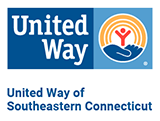New ALICE Report shows pandemic aids temporarily blunted the financial crisis, yet even those supports were not enough.
 The ranks of New London County households unable to afford the basics grew by 21% during the first two years of the COVID-19 pandemic, resulting in a total of 41,172 or 37% of households struggling to afford the basics by 2021, according to a new report from United Way of Southeastern Connecticut and its research partner United For ALICE.
The ranks of New London County households unable to afford the basics grew by 21% during the first two years of the COVID-19 pandemic, resulting in a total of 41,172 or 37% of households struggling to afford the basics by 2021, according to a new report from United Way of Southeastern Connecticut and its research partner United For ALICE.
These families, defined as ALICE (Asset Limited, Income Constrained, Employed), include those who earn above the Federal Poverty Level (9% of households fall below) but less than what’s needed to survive in the modern economy. ALICE families have been overlooked and undercounted by traditional poverty measures. ALICE is the nation’s childcare workers, home health aides and cashiers heralded during the pandemic – those working low-wage jobs, with little or no savings and one emergency away from poverty.
ALICE in the Crosscurrents: COVID and Financial Hardship in Connecticut shows that the total number of financially insecure households in Connecticut rose by 11% between 2019 and 2021 – almost triple the 4% increase in the state’s overall population.
In fact, Connecticut ranked 19th in financial hardship among all fifty states, with one of the nation’s highest percentages of households struggling to make ends meet in 2021.
According to the report, for a family of four with an infant and a preschooler, the annual ALICE Household Survival Budget, which is the basic cost needed to live and work in New London County was $96,852 in 2021.
Even with the variety of temporary pandemic supports available, in 2021, a family of four with two-full time workers earning salaries as a retail salesperson and a cashier – two of the most common occupations in Connecticut – fell short of affording the family budget by $15,204.
Add inflation and the narrative shifts entirely. Inflation in Connecticut has long contributed to a structural economic problem: wages for jobs essential to the running of the economy are not high enough for workers to afford the household basics they need to support their families. For example, the cost of six household essentials in Connecticut has risen at a faster clip than inflation, leaving low-wage workers priced out of affording the basics.
Using the ALICE Essential’s Index, which tracks the rising cost of essentials, including housing, childcare, food, health care, transportation, and a smartphone plan, and adjusting it for two years, from 2021 to today, yields a projected 18.2% rate of inflation in Connecticut.
“Because this report looks at data from 2021, The ALICE Essentials Index takes into account inflation and what that is doing to our community now,” said Dina Sears-Graves, President and CEO of United Way of Southeastern Connecticut. “ALICE was grappling with a surge in inflation before the rest of us. We need to do better for our essential workers and factor these insights into delivering stronger supports for vulnerable families.”
“ALICE doesn’t buy power boats or hire landscapers — ALICE is doing the landscaping,” said Stephanie Hoopes, Ph.D., national director for United For ALICE, a U.S. research organization driving solutions to financial hardship. “ALICE is simply trying to afford safe housing and dinner on the table.”
Click here to read and download the full ALICE Report.
To learn more about the ALICE Essentials Index, and to explore the online dashboards, visit UnitedForALICE.org/Essentials-Index.
ABOUT UNITED FOR ALICE
United For ALICE is a U.S. research organization driving innovation, research and action to improve life across the country for ALICE (Asset Limited, Income Constrained, Employed) and for all. Through the development of the ALICE measurements, a comprehensive, unbiased picture of financial hardship has emerged. Harnessing this data and research on the mismatch between low-paying jobs and the cost of survival, ALICE partners convene, advocate and collaborate on solutions that promote financial stability at local, state and national levels. This grassroots ALICE movement, led by United Way of Northern New Jersey, has spread to 27 states and includes United Ways, corporations, nonprofits and foundations in Arkansas, Connecticut, Delaware, Florida, Georgia, Hawai‘i, Idaho, Illinois, Indiana, Iowa, Kansas, Louisiana, Maine, Maryland, Michigan, Mississippi, New Jersey, New York, Ohio, Oregon, Pennsylvania, Tennessee, Texas, Virginia, Washington, Washington, D.C., West Virginia and Wisconsin; we are United For ALICE. For more information, visit: UnitedForALICE.org
